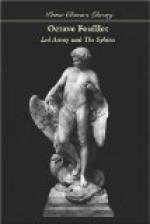I shrugged my shoulders. I freed myself from him and dashed after Monsieur George; but, being better mounted than myself, he had already gained considerable advance. I was still a hundred paces behind him when he overtook Monsieur de Mauterne, who had stopped on hearing him coming. It seemed to me that they were exchanging a few words, and almost at once I saw Monsieur George’s whip lashing several times, and with a sort of fury, Monsieur de Mauterne’s face. We barely arrived in time, Monsieur de Breuilly and myself, to prevent that scene from assuming an odious character of brutality.
A meeting having unfortunately become inevitable between the parties, we took with us the two friends who accompanied Mauterne, Messieurs de Quiroy and Astley, the latter an Englishman. Monsieur George had preceded us to the chateau. The choice of weapons belonged without any possible doubt to our adversary. Nevertheless, having noticed that his seconds seemed to hesitate with a sort of indifference, or perhaps of circumspection between swords and pistols, I thought that we might, with a little good management, influence their decisions in the direction least unfavorable to us. We went, therefore, Monsieur de Breuilly and I, to consult Monsieur George on the subject. He pronounced at once in favor of swords.
“But,” remarked Monsieur de Breuilly, “you are a very good pistol-shot. I have seen you at work. Are you certain to be a better swordsman? Do not deceive yourself; this will be a mortal combat.”
“I am satisfied of that,” he replied, with a smile; “but I am particularly anxious for swords, if at all possible.”
After the expression of so formal a wish, we could but esteem ourselves fortunate in obtaining the choice of arms, and the meeting was settled for the next morning at nine o’clock.
During the remainder of the day, Monsieur George manifested an ease of mind, and even at intervals a certain gayety, at which we were quite surprised, and which Madame de Malouet, in particular, was at a loss to understand. My poor wife of course had been left in ignorance of these recent events.
At ten o’clock he retired, and I could still see a light through his window two hours later. Impelled by my earnest affection and I know not what vague anxiety was haunting me, I entered his room at about midnight; I found him very calm; he had been writing and was just sealing up a few envelopes.
“There!” he said, handing me the papers. “Now the worst is over, and I am going to sleep the sleep of the just.”
I thought it best to offer him a few more technical suggestions on the handling of the weapon he was soon to use. He listened to me without much attention, and suddenly extending his arm:
“Feel my pulse,” he said.
I did so, and ascertained that his calm and his cheerfulness were neither affected nor feverish.
“In such a condition,” he added, “if a man is killed it is because he is willing to be. Good-night, my dear sir!” Whereupon I left him.




